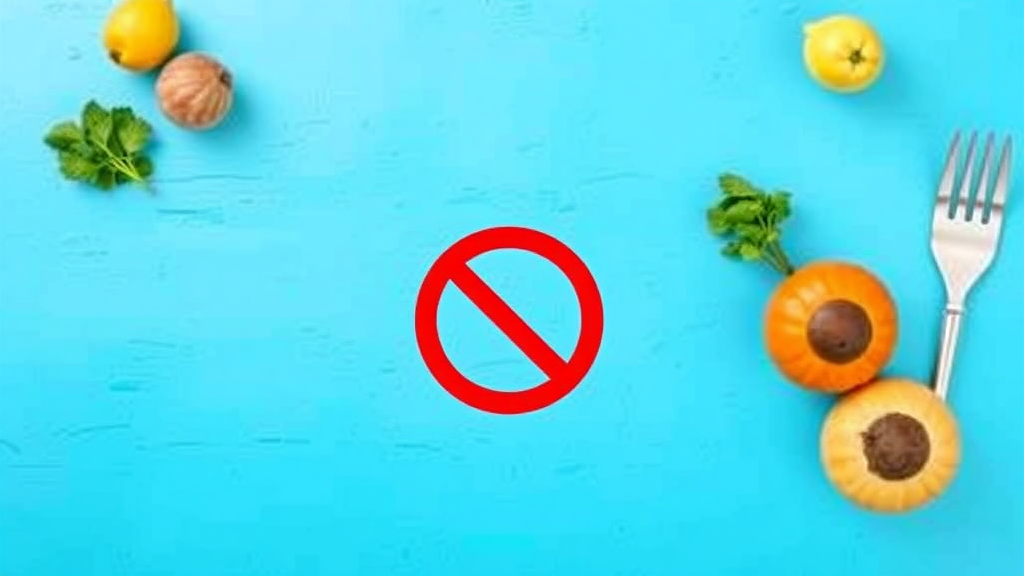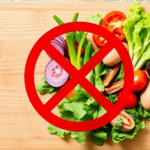Foods to Avoid for Faster Weight Loss: Understanding the Impact on Your Diet
When it comes to losing weight, understanding which foods to avoid can significantly enhance your efforts. The foods you choose to eat—or not eat—can influence your weight loss results. By steering clear of high-calorie, low-nutritional value options, you can hasten your journey toward your weight loss goals. Here are some common foods you should consider avoiding:
Processed Foods
Processed foods often contain high levels of sugar, unhealthy fats, and preservatives. These ingredients can lead to overeating and might contribute to weight gain.
- Examples: Snack cakes, biscuits, and microwave meals.
- These foods often have added sugars and refined grains that provide little nutritional value.
Sugary Drinks
Drinks loaded with sugar, such as sodas, energy drinks, and sweetened teas, can pack on a significant number of calories without you realizing it. Here’s why you should think twice:
- One can of soda can contain over 150 calories.
- Many sugary drinks do not provide satiety, leading you to consume more calories overall.
White Bread and Pasta
White bread and pasta are made from refined carbohydrates, which can cause spikes in blood sugar. Instead of providing lasting energy, they quickly leave you feeling hungry.
- They lack fiber—something that is crucial for digestion and feeling full.
- Switching to whole grains can help improve satiety and keep your energy levels stable.
Fried Foods
Foods that are deep-fried tend to be high in calories and unhealthy fats. This combination makes them easy to overeat, which can significantly derail your weight loss plan.
- Common fried items: French fries, fried chicken, and doughnuts.
- Opt for grilled or baked options instead to reduce calorie intake.
Ice Cream and Other High-Calorie Desserts
While an occasional dessert can be satisfying, indulging regularly in high-calorie treats like ice cream can lead to unwanted weight gain.
- Start by replacing ice cream with yogurt or frozen fruit for a healthier option.
- Be mindful of portion sizes with any desserts.
Trans Fats
Trans fats are unhealthy fats found in many processed and fried foods. They raise bad cholesterol levels while lowering good cholesterol, increasing the risk of heart disease.
- Read food labels and look for “partially hydrogenated oils.”
- Avoiding these will help improve overall health and assist in weight loss.
High-Calorie Sauces and Dressings
Many sauces and dressings—especially those that are creamy or sugary—can add unnecessary calories to your meals.
- For example:
- Choosing vinaigrettes or low-calorie options can help maintain flavor without the excess calories.
| Item | Calories (per serving) |
|---|---|
| Ranch Dressing | 145 |
| Creamy Alfredo Sauce | 200 |
| Sugar-Based BBQ Sauce | 150 |
By being mindful of these foods, you can create a healthier diet that supports faster weight loss. Remember, focus on whole, unprocessed foods, plenty of fruits and vegetables, lean proteins, and whole grains.
For more tips and support, consider visiting Eat Right and NCBI. These resources provide valuable insights into healthy eating and weight management.
The Role of Sugary Beverages in Weight Gain
High-calorie sugary beverages are increasingly recognized as significant contributors to weight gain. These drinks often come in attractive packaging and are marketed as refreshing options, but their hidden dangers are causing concern among health professionals. Understanding the impact of these beverages on weight management is crucial for anyone looking to lose weight or maintain a healthy lifestyle.
Sugary beverages include sodas, energy drinks, sweetened teas, and certain fruit juices. Unlike solid foods, liquids can be consumed quickly and without much thought, resulting in excessive calorie intake without creating a sense of fullness. This disconnect leads many people to overlook their contributions to daily caloric intake.
Caloric Content of Sugary Beverages
Many sugary drinks contain high amounts of added sugars. The U.S. Centers for Disease Control and Prevention (CDC) notes that a typical 12-ounce soda can contain around 150 calories and about 39 grams of sugar. Below is a breakdown of some common sugary beverages and their caloric content:
| Beverage | Serving Size | Calories | Total Sugars (g) |
|---|---|---|---|
| Soda | 12 oz. | 150 | 39 |
| Sweetened Iced Tea | 12 oz. | 120 | 28 |
| Energy Drink | 8 oz. | 113 | 29 |
| Fruit Juice (with added sugar) | 8 oz. | 112 | 24 |
When you consider that the average adult should consume no more than 2000-2500 calories per day, adding just one sugary beverage can constitute a significant portion of your daily intake. The hidden sugars in these drinks can lead to weight gain if not managed properly.
The Connection Between Sugary Beverages and Weight Gain
One major reason sugary beverages contribute to weight gain is their high glycemic index. These drinks cause a rapid spike in blood sugar levels, which may lead to increased hunger shortly after consumption. Consequently, individuals may be more likely to snack on additional food, further increasing their calorie intake.
Furthermore, unlike whole foods that provide essential nutrients, sugary beverages often lack vitamins and minerals. This leads to ’empty calories,’ which may leave you feeling hungry and craving more—even after consuming a substantial number of calories.
Health Risks Associated with Excessive Sugar Consumption
Beyond weight gain, excessive intake of sugary beverages can lead to several health issues:
- Type 2 Diabetes: High sugar consumption has been linked to an increased risk of developing insulin resistance, which can lead to type 2 diabetes.
- Heart Disease: A diet high in added sugars is associated with a higher risk of heart disease, due to factors like increased triglyceride levels and obesity.
- Dental Issues: Sugars are a primary culprit in tooth decay, contributing to cavities and gum disease.
Tips to Reduce Sugary Beverage Consumption
If you want to avoid weight gain and maintain a healthy lifestyle, here are some strategies:
- Opt for Water: Drinking water instead of sugary beverages can drastically reduce your calorie intake.
- Read Labels: Check labels for hidden sugars in drinks and choose options with no added sugars.
- Choose Unsweetened Drinks: Switch to unsweetened tea or flavored water to satisfy your thirst.
- Limit Intake: If you enjoy soda or other sugary drinks, limit your intake to special occasions rather than daily habits.
By making small changes to your beverage choices, you can significantly impact your weight management goals. For more information about dietary habits and weight loss, visit CDC’s Healthy Weight or read more about the influences of sugar on your health at World Health Organization.
Being mindful of the sugary beverages you consume is a critical step toward losing weight faster and achieving your health goals. By understanding their impact and making well-informed choices, you can lead a healthier, more balanced lifestyle.
Hidden Sugars: Why Processed Foods Might Sabotage Your Goals
When aiming for weight loss, it’s easy to zero in on calories and exercise while potentially overlooking a crucial factor: hidden sugars in processed foods. These sneaky ingredients can add unwanted calories, disrupt your metabolism, and sabotage your efforts. Understanding how to identify these sugars and why they can be problematic is key to achieving your weight loss goals.
Understanding Hidden Sugars
Hidden sugars are those that are not immediately obvious, often lurking in foods that seem healthy or are marketed as “low fat”. The primary sources of hidden sugars include:
- Breakfast cereals: Many cereals have high sugar content, even if they claim to be healthy.
- Condiments: Ketchup, salad dressings, and BBQ sauce often contain hidden sugars.
- Low-fat products: These may have added sugars to enhance flavor.
- Snacks and granola bars: Many snacks are loaded with sugars for taste.
- Fruit juices and smoothies: Often contain more sugar than eating whole fruits.
Why Processed Foods Are Problematic
Processed foods can hinder your weight loss efforts in several ways:
- High-Calorie Content: Many processed foods are calorie-dense due to added sugars and unhealthy fats, making it easy to exceed your daily caloric needs.
- Blood Sugar Spikes: Foods high in sugar can lead to rapid spikes in blood sugar followed by crashes, resulting in cravings shortly after eating.
- Altered Metabolism: Constant consumption of high-sugar foods can affect how your body burns fat and uses energy.
- Uncontrollable Cravings: Sugar releases dopamine in the brain, making you crave more and more, leading to overeating.
Identifying Hidden Sugars
To reclaim control over your weight loss journey, it’s important to learn how to identify hidden sugars. The following tips can help you make informed choices:
- Read Labels: Always check nutrition labels for sugars, especially ingredients that end in “-ose”, such as glucose, fructose, or sucrose.
- Look for Multiple Forms of Sugar: Products may contain several types of sugar. If sugar appears within the first few ingredients, it’s a red flag.
- Beware of “Natural” Sugars: Ingredients like honey, agave, and maple syrup are still sugars and can contribute to your overall sugar intake.
- Use Apps: Several mobile apps can scan products and showcase their sugar content for quick reference.
How to Reduce Sugar Intake
Reducing sugar intake requires mindful decisions. Here are some strategies:
- Choose Whole Foods: Opt for whole foods such as vegetables, fruits, lean proteins, and whole grains to avoid hidden sugars.
- Prepare Your Meals: Cooking at home allows you to control the ingredients, significantly reducing hidden sugars.
- Limit Processed Snacks: Replace processed snacks with healthier options like nuts, seeds, or yogurt with no added sugars.
- Hydrate Wisely: Drink water instead of sugary drinks. If you’re craving flavor, try infusing water with fruits and herbs.
Making small changes can lead to significant results over time. Healthline provides great insights on hidden sugars and their effects on health.
Foods to Be Wary Of
Here’s a list of foods to be particularly cautious of when trying to avoid hidden sugars:
| Food Type | Common Brands | Sugar Content per Serving |
|---|---|---|
| Flavored Yogurt | Yoplait, Dannon | up to 20 grams |
| Granola Bars | Nature Valley, Quaker | 10-15 grams |
| Sports Drinks | Gatorade, Powerade | 14 grams |
| Sauces and Condiments | Ketchup, BBQ Sauce | up to 6 grams per tablespoon |
Being aware of hidden sugars can empower you to make better dietary choices. Remember, every small step counts towards your goals. Focus on simple, unprocessed foods, and take the time to read labels. This awareness will be key in your journey to lose weight effectively and sustainably. For more insights on maintaining a healthy diet, check out Eat Right.
The Dangers of Refined Carbohydrates in Your Meal Plan
When planning a healthy meal, it’s crucial to understand the impact of refined carbohydrates on your body. These ingredients, found in many popular foods, can derail your weight loss efforts and affect your overall health.
Refined carbohydrates are carbohydrates that have been processed to strip away the bran, germ, and fiber from the original grain. This process makes them easier to digest, but it also removes many of the essential nutrients and increases the glycemic index, leading to spikes in blood sugar levels.
Common Sources of Refined Carbohydrates
- White bread and pastries
- Many breakfast cereals
- White rice
- Pasta made from white flour
- Snack foods, such as chips and crackers
- Sugary beverages and energy drinks
- Candy and other sugary treats
Including these foods in your daily diet can lead to numerous health issues. Here are some of the risks associated with consuming refined carbohydrates:
Weight Gain and Obesity
Refined carbohydrates are often high in calories but low in nutritional value, which can lead to weight gain. When you consume these foods, your body metabolizes them quickly, resulting in a rapid spike in blood sugar. This can cause a subsequent crash, leading to increased hunger and cravings for more unhealthy foods.
Increased Risk of Chronic Diseases
Regular consumption of refined carbs is linked to various chronic diseases, such as:
- Type 2 Diabetes
- Heart Disease
- High Blood Pressure
These conditions arise due to the excessive blood sugar fluctuations and the inflammatory responses they can trigger in the body.
Digestive Issues
Because refined carbohydrates lack fiber, they can lead to digestive problems such as constipation. Fiber is essential for healthy digestion and can help keep you feeling full, which is critical for weight loss. A diet low in fiber can cause bloating and discomfort.
Mental Health Effects
Surprisingly, your mood can also be affected by what you eat. Refined carbohydrates can contribute to mood swings and increased anxiety. As your blood sugar levels drop, you may find yourself feeling irritable or fatigued.
To make healthier choices, consider replacing refined carbohydrates with whole foods. Whole grains, fruits, vegetables, and legumes are not only filling but also offer a plethora of nutrients that your body needs. Here’s a list of healthier alternatives:
Healthier Alternatives to Refined Carbohydrates
| Refined Carb | Whole Food Alternative |
|---|---|
| White bread | Whole-grain bread |
| White rice | Brown rice or quinoa |
| Regular pasta | Whole-wheat pasta or vegetable noodles |
| Candy | Fruit or dark chocolate |
When trying to eliminate refined carbohydrates from your diet, it’s crucial to read labels carefully. Many processed foods contain hidden refined sugars and carbs that can surprise you. Always look for products that list whole grains as the first ingredient, and aim to avoid items with long lists of additives.
Furthermore, being mindful of your portion sizes and snacking habits can significantly help in steering clear of refined carbs. Keep healthy snacks like nuts, fruits, and yogurt on hand to curb cravings and promote better eating habits.
For more information about the dangers of refined carbohydrates and healthier eating, you can visit Healthline or Eat Right.
By understanding what foods to avoid, you can take crucial steps towards not only losing weight faster but also improving your overall health and well-being. Remember, making small changes in your diet can lead to substantial benefits in the long run.
Healthy Fats vs. Unhealthy Fats: Making the Right Choices
Understanding the different types of dietary fats is essential for making healthier food choices. Fats are not just calorie-dense substances; they play a vital role in your body’s functions. However, not all fats are created equal. Identifying healthy fats versus unhealthy fats can help you improve your overall health and maintain a balanced diet. Here’s a closer look at both types of fats.
Healthy Fats
Healthy fats are generally unsaturated fats, which can be beneficial to your heart and overall well-being. These fats can lower bad cholesterol levels and reduce the risk of heart disease. healthy fats into your diet is essential for your health. Here are some examples:
- Monounsaturated fats: Found in olive oil, avocados, and nuts, these fats can improve cholesterol levels and help with weight management.
- Polyunsaturated fats: These include omega-3 and omega-6 fatty acids found in fatty fish like salmon, walnuts, and flaxseeds. They are known for their anti-inflammatory properties.
Including a mix of these healthy fats in your diet can provide you with essential nutrients and help you feel satiated. Here’s a simple table to summarize some sources of healthy fats:
| Type of Healthy Fat | Sources |
|---|---|
| Monounsaturated Fats | Olive oil, avocados, nuts |
| Polyunsaturated Fats | Fatty fish, walnuts, flaxseeds |
Unhealthy Fats
Unhealthy fats usually refer to saturated fats and trans fats. These fats can raise bad cholesterol levels, leading to an increased risk of heart disease and other health problems.
- Saturated fats: Commonly found in red meat, full-fat dairy products, and coconut oil. While some saturated fats may have less impact on health than others, it’s advisable to consume them in moderation.
- Trans fats: Often found in processed foods, trans fats are created through industrial processes that make liquid oils solid. These can be found in margarine, baked goods, and fried foods. Trans fats are the most harmful type of fat and should be avoided as much as possible.
Here’s a table that lists common sources of unhealthy fats:
| Type of Unhealthy Fat | Sources |
|---|---|
| Saturated Fats | Red meat, full-fat dairy, butter |
| Trans Fats | Margarine, fried foods, baked snacks |
How to Make the Right Fat Choices
Choosing the right types of fats is critical for your health. Here are some practical tips to help you navigate your fat intake:
- Opt for olive oil instead of butter or margarine when cooking or dressing salads.
- Incorporate more nuts and seeds into your snacks or meals instead of chips or processed snacks.
- Choose fatty fish for your protein intake a few times a week to harness the benefits of omega-3 fatty acids.
- Limit processed and fast foods that are often high in unhealthy trans fats.
Balancing your fat intake is essential for maintaining a healthy lifestyle. If you want to delve deeper into understanding healthy fats and their benefits, visit Healthline or check out Mayo Clinic.
Being mindful of the fats you consume can have a significant impact on your overall health. By incorporating healthy fats into your diet and minimizing unhealthy fats, you’re making a smart choice that benefits both your body and mind.
Snacking Smart: Foods That Hinder Weight Loss Progress
When you’re on a weight loss journey, understanding what foods to avoid can significantly boost your progress. Many people are unaware that certain snacks, often thought of as guilt-free, can actually stall fat loss. Here’s a look at some key foods to steer clear of in order to achieve your weight loss goals more effectively.
Refined Sugars
Refined sugars are among the most detrimental to your weight loss efforts. Foods high in sugar provide empty calories, meaning they offer little to no nutritional value. These can lead to quick spikes in blood sugar levels, followed by crashes that leave you craving more. Common culprits include:
- Candy and sweets
- Pastries and cakes
- Sugary cereals
- Soft drinks and energy drinks
If you find yourself reaching for sugary snacks, consider swapping them for fruits, which provide natural sugars along with fiber and essential vitamins.
Processed Foods
Processed foods are often loaded with unhealthy fats, sugars, and preservatives. They may be convenient, but they can hinder your weight loss efforts. Specific items to avoid include:
- Chips and crackers
- Frozen meals high in sodium
- Instant noodles
- Processed meats, like sausages and deli meats
By choosing fresh, whole foods instead, you’ll not only consume fewer calories but also improve your overall health.
High-Calorie Snacks
Snacking can be a double-edged sword when it comes to weight loss. While healthy snacks can keep your metabolism fired up, high-calorie options can lead to overeating. Avoid snacks like:
- Large servings of nuts and trail mix
- Nut butter when eaten straight
- Cheese cubes or cheese dips
- Granola bars with a high sugar content
Instead, opt for low-calorie snacks such as veggie sticks with hummus or air-popped popcorn.
White Carbs
White carbs like white bread, pasta, and rice lack the fiber and nutrients found in whole grains. These foods can cause a rapid increase in blood sugar and may lead to weight gain. Consider switching to whole grains which will provide more fiber, keeping you fuller longer. Examples of healthier options include:
- Whole grain bread
- Brown rice
- Quinoa
- Barley
Foods with High Saturated Fats
Foods high in saturated fats can not only impact your weight loss but also your heart health. Fatty cuts of meat, full-fat dairy products, and fried foods fall into this category. Limiting these can greatly help you in your weight loss efforts. Alternatives might include:
- Lean meats like chicken and turkey
- Fat-free or low-fat dairy options
- Grilled or baked preparations instead of frying
Artificial Sweeteners
While they are often marketed as a healthier alternative to sugar, artificial sweeteners can confuse your body’s hunger signals and lead to cravings for sweet foods. Items containing these include:
- Diet sodas
- Low-calorie snacks and desserts
- Coffee creamers
Instead, consider using natural sweeteners like honey or agave in moderation.
Becoming mindful of what foods hinder your weight loss can make a substantial difference. Focus on whole, unprocessed foods and healthy snacks to promote a sustainable weight loss journey. For more information on healthy habits and weight loss strategies, visit Eat Right or check out Choose My Plate for guidance on nutritious eating.
Emotional Eating: How Certain Foods Can Affect Your Mindset and Weight
Emotional eating affects many people, often causing challenges in both mindset and weight management. Understanding how certain foods can influence your emotions and physical health is crucial for making better dietary choices. By recognizing these patterns, you can tackle emotional eating, improve your mindset, and assist your weight loss journey.
When you’re feeling stressed, sad, or anxious, your body can crave specific foods. These foods often provide comfort but can also inadvertently lead to weight gain. Here are some common emotional triggers and associated foods that may not serve your goals:
- High-Sugar Treats: Foods packed with sugar, like candies and pastries, provide an instant buzz. However, they can lead to energy crashes, mood swings, and cravings, creating a vicious cycle.
- Processed Comfort Foods: Items like chips and frozen meals are usually high in unhealthy fats and additives. They may offer temporary satisfaction but contribute to long-term health issues.
- Alcohol: Many reach for a glass of wine or beer when feeling down. While it might seem comforting, alcohol can affect mood negatively and add empty calories to your diet.
- Fast Food: Convenience often leads to cravings for fast food. While it might soothe temporary hunger, it typically includes unhealthy fats and excess sodium, ultimately affecting your emotional well-being.
Understanding the connection between foods and your emotions empowers you to make an informed choice. You can swap out these unhealthy options with healthier alternatives that improve both mood and weight. Here are some beneficial foods to consider:
- Fruits and Vegetables: Filled with vitamins and minerals, fruits and veggies can naturally enhance your mood and energy levels.
- Whole Grains: Foods high in fiber, like brown rice and quinoa, keep you full longer and stabilize blood sugar levels, helping in emotional regulation.
- Nuts and Seeds: Rich in healthy fats and protein, nuts and seeds like almonds and chia seeds can satisfy cravings without compromising your diet.
- Lean Proteins: Sources like chicken, fish, and legumes can support overall health and help maintain a stable mood.
Sometimes, it’s essential to address why you reach for certain foods in moments of stress or sadness. Here are a few strategies that may help:
- Identify Triggers: Recognizing what prompts emotional eating can help you find alternatives.
- Practice Mindfulness: Being present during meals can curb mindless eating and allow you to savor what you eat.
- Find Alternatives: Whenever a craving strikes, consider reaching for a healthier option or an activity to replace eating.
- Seek Support: Speaking with friends or a professional can provide helpful insights into managing emotional eating.
Your relationship with food does not have to be complicated. Making conscious decisions about what you eat while understanding the link between your mindset and food can greatly aid in achieving your weight loss goals. By incorporating healthier options and being aware of emotional triggers, you can pave the way toward a healthier you.
Seeking more resources on emotional eating and its impact can strengthen your resolve. Websites like Eating Disorder Hope and National Eating Disorders Association can provide valuable insights.
Find what works for you by prioritizing both physical and emotional health. Your journey toward weight loss is not just about the food; it’s about creating a supportive mindset that encourages positive change.
Key Takeaway:
When it comes to losing weight faster, understanding what foods to avoid is crucial. By making informed dietary choices, you can enhance your weight loss journey significantly. Here are some key takeaways based on various aspects of how certain foods impact your diet.
Understanding the Impact of Food Choices: The types of foods you include in your diet can either support or hinder your weight loss efforts. By steering clear of certain food categories, you can create a more effective and sustainable weight loss plan.
Say No to Sugary Beverages: Sugary drinks, like sodas and energy drinks, play a significant role in weight gain. These beverages are often high in calories and contain little nutritional value. By replacing them with water or herbal teas, you can drastically cut your calorie intake, supporting faster weight loss.
Beware of Hidden Sugars: Processed foods might seem convenient, but they often contain hidden sugars that can sabotage your weight loss goals. Always check labels for added sugars, and opt for whole, unprocessed foods to keep your sugar intake in check.
Dangers of Refined Carbohydrates: Refined carbs, such as white bread and pastries, can spike your blood sugar levels and lead to increased hunger. Eliminating these foods can help stabilize your energy levels and reduce cravings, making it easier to stick to your weight loss plan.
Healthy Fats vs. Unhealthy Fats: While healthy fats from sources like avocados and nuts can promote feeling full, unhealthy fats from fried foods can lead to weight gain. Focus on incorporating healthy fats into your diet while avoiding trans and saturated fats.
Snacking Smart: Many common snacks, like chips and sugary granola bars, can hinder your progress. Choose healthier snack options like fruits, vegetables, or nuts, which provide essential nutrients without excessive calories.
Emotional Eating: Certain foods can impact your mood and mindset, leading to emotional eating. Being aware of your eating triggers and finding healthier coping mechanisms can help you avoid this pitfall.
By keeping these insights in mind and carefully considering the foods you choose to avoid, you can create a healthier diet that supports quicker weight loss. This awareness will not only help you shed pounds more efficiently but will also contribute to your overall well-being. Taking control of your food choices empowers you to achieve your weight loss goals more successfully.
Conclusion
Navigating your weight loss journey can be challenging, especially when it comes to understanding what foods to avoid for faster results. Recognizing the impact of sugary beverages, for example, is crucial; these drinks often lead to unnecessary calorie consumption and hunger spikes. It’s also important to be aware of hidden sugars in processed foods, which can sabotage your efforts without you even realizing it.
Moreover, you should pay attention to refined carbohydrates. Foods like white bread and pastries can cause rapid spikes in blood sugar levels, making weight management more difficult. On the flip side, understanding the difference between healthy and unhealthy fats is vital. While some fats are essential for bodily functions, others can contribute to weight gain and increased appetite.
Another key element is snacking habits. Choosing snacks that are high in sugar or refined carbs can hinder your progress, making it essential to opt for healthier alternatives. Additionally, emotional eating can create a cycle that negatively impacts your mindset and weight. Recognizing how certain foods can trigger emotional responses is an important step in achieving your weight loss goals.
By being mindful of these food categories and making informed choices, you can create a healthier diet that supports your weight loss journey. Remember, it’s not just about cutting calories; it’s about selecting the right foods that fuel your body and promote sustainable weight loss. Prioritize healthier options, and you’ll likely see faster and more lasting results.












